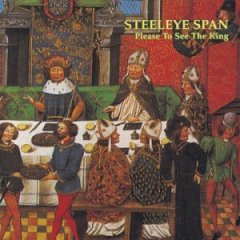- Please to See the King
Infobox Album |
Name = Please To See The King
Type =Album
Artist =Steeleye Span

Released = 1971
Recorded = 1971
Genre =Electric folk
Length = 41:39
Label = Chrysalis
Producer =
Reviews = *Allmusic 3/5 [http://www.allmusic.com/cg/amg.dll?p=amg&sql=10:w1abqj6bojha link]
Last album = "Hark! The Village Wait " (1970)
This album = "Please To See The King" (1971)
Next album = "Ten Man Mop, or Mr. Reservoir Butler Rides Again " (1971)"Please To See The King" is the second album by
Steeleye Span , released in 1971. A substantial personnel change following their previous effort, "Hark! The Village Wait ", brought about little substantial change in their overall sound, except for the lack of both drums and a second female vocal. The band even reprised a song from their debut, "The Blacksmith", with a similar, but more electric, arrangement. Re-recording songs would be a minor theme in Steeleye's output over the years, with the band eventually releasing an entire album of reprises, "Present--The Very Best of Steeleye Span ".The title of the album is derived from the "Cutty Wren" ceremony. A
winter wren in a cage is paraded as if it were a king. This rite was carried out onDecember 26 ,Saint Stephen 's Day, and is connected to earlyChristmas celebrations. The song "The King", appearing on the album, addresses this, and is often performed as aChristmas carol . Steeleye returned to this material on "Live at Last" with "Hunting the Wren" and on Time with the song "TheCutty Wren ". The custom ofWrenboys is mostly associated with Ireland, but it has been recently revived in England.All songs appearing on the original album are traditional. "The False Knight on the Road" is one of the
Child Ballads (#3), and concerns a boy's battle of with thedevil in a game of riddles. Hart and Prior had already recorded a version of the song on their album 'Summer Solstice'. "The Lark in the Morning", one of their more popular songs, has the same title as a different song about a lusty ploughboy, though there are strong similarities. This version was collected byRalph Vaughan Williams . "Boys of Bedlam", a variant ofTom o' Bedlam ", is told from the perspective of a member of a lunatic asylum. Carthy and Prior open the song by singing into the back of banjos, producing a muffled effect. The band uses the earliest printed version of the song, fromWit and Mirth, or Pills to Purge Melancholy by Thomas d'Urfey. Melody Maker made this their folk album of the year. Music journalist Colin Irwin in his book "In Search of Albion" describes it as one of his favourite folk-rock albums. It reached number 45 in the UK album charts, originally onB & C Records but before the year was out the rights were acquired byMooncrest Records who re-released it the same year, with different cover art.Personnel
*
Maddy Prior - (vocals, spoons, tabor,tambourine )
*Tim Hart - (vocals,guitar , dulcimer)
*Peter Knight - (violin ,mandolin , vocals, organ, bass)
*Ashley Hutchings (bass, vocals)
*Martin Carthy (vocals, guitar,banjo , organ).Produced by Sandy Roberton.
Track listing
#"The Blacksmith"
#"Cold Haily, Windy Night"
#"Jigs: Bryan O'Lynn / The Hag With The Money"
#"PrinceCharlie Stuart "
#"Boys OfBedlam "
#"False Knight On The Road"
#"The Lark In The Morning"
#"Female Drummer"
#"The King"
#"Lovely On The Water"Bonus track::11.
Rave On (Buddy Holly / Hardin). An a cappella version of a Buddy Holly song. It was meant as a prank to mock Ashley's solemnity, but he ended up liking it. This is a bonus track not on the original release.Bonus tracks
In 2006 Castle Music re-issued the album with the 10 original tracks and 25 bonus tracks, on 2 CDs. The bonus tracks were all poorly-recorded tapes of live BBC radio broadcasts (3 from TV). Only six of these were tracks not already available in good studio versions. The song "I Was a Young Man" is almost identical to the way Martin Carthy sang it on "Battle of the Field" by The Albion Country Band. The song "Gallant Poacher" was also that album. Steeleye Span's bonus track version is very similar. "College Grove/Silver Spear" is a pair of jigs by Peter Knight. "Lay Down Your Weary Tune" is a Dylan song, sung a cappella. "Farther Along" is a traditional gospel-blues song, also sung a cappella. "Let's Dance" is obviously a companion-piece to "Rave On". It is the well-known hit by
Chris Montez . "Bring 'Em Down/A Hundred Years Ago" is a pair of sea shanties. Incidentally, "Hitler 's Downfall" is actually the instrumental "Bryan O'Lynn", already available in a studio recording.
Wikimedia Foundation. 2010.
